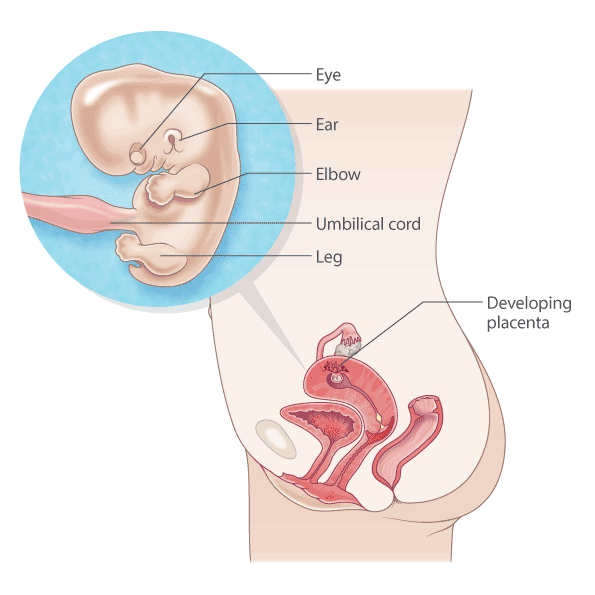
9 Weeks Pregnant: A Comprehensive Guide to Your Pregnancy Journey
Congratulations on reaching the ninth week of your pregnancy! This is an exciting and transformative time as your body undergoes significant changes to accommodate the growing life within you. This comprehensive guide will provide you with all the essential information you need to know about the ninth week of pregnancy, including fetal development, common symptoms, and important prenatal care tips.
Fetal Development at 9 Weeks
At nine weeks, your baby is about the size of a grape, measuring approximately 0.63 inches (1.6 centimeters) in length and weighing around 0.04 ounces (1.1 grams). Despite its tiny size, your baby is rapidly developing and undergoing remarkable changes.
- Head and Facial Features: The baby’s head is disproportionately large compared to its body, and the facial features are becoming more defined. The eyes, nose, and mouth are now visible, and the ears are beginning to form.
- Limbs: The arms and legs are elongating, and the fingers and toes are starting to develop.
- Internal Organs: The baby’s internal organs, including the heart, lungs, and digestive system, are continuing to develop and function.
- Placenta: The placenta, which is responsible for providing nutrients and oxygen to the baby, is fully formed and functioning.
- Heartbeat: The baby’s heartbeat can now be detected using a Doppler ultrasound.
Common Symptoms at 9 Weeks
As your pregnancy progresses, you may experience a range of symptoms, including:
- Morning Sickness: Nausea and vomiting are common during the first trimester, especially in the morning.
- Fatigue: Increased levels of progesterone can make you feel tired and sluggish.
- Breast Tenderness: Your breasts may become swollen and tender as they prepare for milk production.
- Frequent Urination: The growing uterus puts pressure on your bladder, leading to more frequent urination.
- Mood Swings: Hormonal changes can cause mood swings and emotional sensitivity.
- Food Cravings and Aversions: You may develop strong cravings for certain foods or an aversion to others.
- Constipation: Progesterone can slow down your digestive system, leading to constipation.
- Light Bleeding or Spotting: Some women experience light bleeding or spotting during the first trimester, which is usually not a cause for concern.
Prenatal Care at 9 Weeks
Regular prenatal care is crucial for ensuring a healthy pregnancy for both you and your baby. At your nine-week appointment, your healthcare provider will typically:
- Confirm Your Pregnancy: If you have not already done so, your pregnancy will be confirmed through a blood or urine test.
- Medical History and Physical Exam: Your healthcare provider will review your medical history and perform a physical exam to assess your overall health and well-being.
- Ultrasound: An ultrasound may be performed to confirm the baby’s heartbeat, determine its size and location, and rule out any potential complications.
- Blood Tests: Blood tests may be ordered to check your blood type, Rh factor, and hemoglobin levels.
- Prenatal Vitamins: Your healthcare provider will recommend prenatal vitamins to ensure you are getting the necessary nutrients for your pregnancy.
- Lifestyle Advice: Your healthcare provider will provide guidance on healthy lifestyle choices, such as diet, exercise, and avoiding harmful substances.
Tips for a Healthy Pregnancy at 9 Weeks
- Eat a Healthy Diet: Focus on consuming nutrient-rich foods, such as fruits, vegetables, whole grains, and lean protein.
- Stay Hydrated: Drink plenty of fluids, especially water, to prevent dehydration.
- Get Regular Exercise: Engage in moderate-intensity exercise, such as walking, swimming, or yoga, for at least 30 minutes most days of the week.
- Avoid Harmful Substances: Refrain from smoking, drinking alcohol, and using illicit drugs.
- Get Enough Sleep: Aim for 7-9 hours of sleep each night to support your physical and emotional well-being.
- Manage Stress: Find healthy ways to manage stress, such as yoga, meditation, or spending time in nature.
- Listen to Your Body: Pay attention to your body’s signals and rest when you need to.
- Connect with Others: Join support groups or connect with other pregnant women to share experiences and offer support.
When to Call Your Healthcare Provider
While most symptoms during the ninth week of pregnancy are normal, it is important to contact your healthcare provider if you experience any of the following:
- Severe or Persistent Nausea and Vomiting: If morning sickness is interfering with your daily activities or causing dehydration.
- Vaginal Bleeding or Cramping: Any significant vaginal bleeding or cramping can be a sign of a potential complication.
- Fever or Chills: A fever or chills may indicate an infection.
- Severe Headache: A sudden or severe headache can be a sign of preeclampsia.
- Vision Changes: Sudden vision changes, such as blurred vision or floaters, can be a sign of gestational hypertension.
Conclusion
The ninth week of pregnancy is a time of significant changes and development for both you and your baby. By understanding the fetal development, common symptoms, and important prenatal care tips, you can navigate this exciting journey with confidence and ensure a healthy pregnancy. Remember to listen to your body, seek support when needed, and enjoy the transformative experience of bringing a new life into the world.